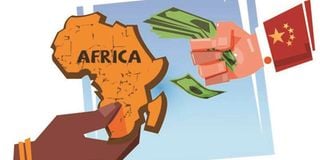Private-public partnerships hold the key to Africa’s economic prosperity

A graphical illustration of China-Africa economic relations.
What you need to know:
- Many multinationals see Africa as a destination to reap short-term, high-return rewards.
- So why should African governments pander to the whims of these “foreigners” a.k.a. multinationals?
Taabu! Wahala! Trouble! If you speak the lingo in various African capitals, this might be how you hear businesses, particularly multinational firms, describe governments.
In return, many a government across the continent typically deign enterprise-related matters as beneath them and believe companies should not take part in the grander, loftier goals of nation-building.
True, many multinationals see Africa as a destination to reap short-term, high-return rewards with their bags packed ready to leave as soon as the predictably volatile regime shows its true colours. This is reminiscent of the proverbial one-night encounter, a relationship doomed to die in the early blush of morning light.
I argue that the two parties are inextricably linked, committed to living under the same roof. As bedfellows though, they may find themselves in the awkward position of having to sleep facing opposite directions – back-to-back in the vein of a lover’s quarrel.
Here is why. Too many years ago, as a young marketing manager based in Lagos for a very large consumer goods company, I woke to see the news headlines that the government had banned the importation of detergents.
While this was clearly catastrophic news for my career prospects, it represented a relatively less consequential decision for my employer. The decision to be made was whether to invest in building a local detergent factory, whose financials might not pay out in many years given the uncertainty of what other decrees might ensue.
Many years later, I encountered a related dilemma while meeting the Health minister of a certain Eastern African country with a multimillion-dollar investment proposal. The official, however, was under strict instructions from the then Head of the State not to discuss anything that did not involve building a factory – the kind politicians love to cut ribbons to commission as a visible symbol of their contribution to progress!
This uncompromising stance seemed unreasonable given the country’s weak negotiating position. According to the World Bank, the combined GDPs of sub- Saharan Africa in 2013 were $1.8 trillion.
Microscopic spoils
The world’s most valuable company in 2020 is Apple, valued at over $2 trillion. You get my point: one Apple equals 49 African countries – sobering. The relative spoils for a multinational looking at numerous African countries appear microscopic!
And global macroeconomic survey data underscores the relative riskiness of the above proposition. The World Bank’s Ease of Doing Business index for 2020 clusters the majority of sub- Saharan African countries in the bottom half of the 190 countries ranked (it should be noted that Kenya is a respectable No. 56, only surpassed by the isle of Mauritius from an African point of view).
The counterargument of African governments is that investors are not in Africa for purely altruistic motives. According to the World Bank’s development indicators, as of 2019, the combined economies of sub-Saharan Africa grew by 2.3 per cent – despite Corona.
This is supported by the exponential growth of foreign direct investment (FDI) pegged at $32 billion in 2019.To use the French phrase appeller un chat un chat – “call a cat a cat” – if these firms were not fulfilling their profit-seeking objectives, they would be in Africa?
So why should African governments pander to the whims of these “foreigners” a.k.a. multinationals?
According to the Harvard economist Ricardo Hausmann, businesses transfer practical know-how within their corporate empires – that is to say from one country that they do business in, to another.
While there is a tendency to romanticise national pride and homegrown innovation, from a practical standpoint, the seeds of homegrown entrepreneurship that some African governments love to tout are vastly overrated.
In an increasingly globalised world, there exist far more efficient and scalable methods of “farming”. The multinational is the ultimate large-scale farmer providing a combine harvester for sowing skills and reaping the rewards of a knowledgeable workforce.
Marriage is the answer to our future joint economic prosperity. It gives us roots, a reason to say let’s buy a home together, have children, join the PTA, etc. This private-public partnership is for-better-or-worse.
The writer is the Managing Partner of C.Suite Africa a boutique management consultancy for #LargeAfricanSMEs. [email protected]





